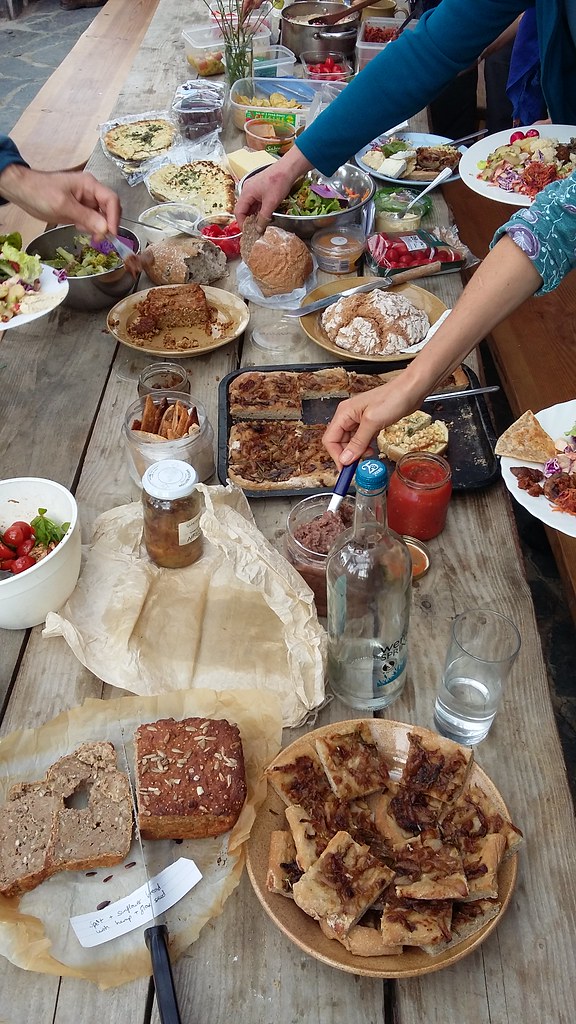by Celia Ashman
Meet other permaculture enthusiasts at the monthly online social
Permaculture Association member calls are every second Wednesday of the month at 7pm. If you’re not a member yet, join today to connect with others in the permaculture community! Here's a flavour of the discussions members have had:
Gardening hacks
 For the theme of our first members’ online social, we went back to basics, sharing our best ‘gardening hacks’ - top tips for solving tricky gardening problems, saving energy, or saving your back!
For the theme of our first members’ online social, we went back to basics, sharing our best ‘gardening hacks’ - top tips for solving tricky gardening problems, saving energy, or saving your back!
After some hot and dry spells in much of the UK, we discussed watering tips, including ways to mulch in order to retain moisture, how to reuse tetrapak cartons to keep roots well watered (a tip from Huw Richards, along with 16 more great ideas) and a design for urine-irrigation system a member has just set up reusing an old wheelie bin!
We also shared ideas for regulating polytunnel temperature using underground pipes, and how to harvest the heat from massive piles of manure! (Top answer: redirect it into a solar shower set up).
Finally, a classic tip, but easily forgotten - keep a gardening diary. Keeping it by the kettle can help remind you to jot down what you’ve done on a tea break, so you can give your memory a break and focus on enjoying your garden.
Finances
 On another call, we discussed how permaculture applies to finances, which led to a fascinating discussion that touched on many things….
On another call, we discussed how permaculture applies to finances, which led to a fascinating discussion that touched on many things….
Understanding zones of finances
Mary introduced the idea of using "Zoning" to understand different spheres of the economy, and how we interact with them:
- Home - connected relationships, eg. household and family, no need to ‘balance the books’
- Herb garden - informal connections, eg. buying a friend a drink, “I owe you one”
- Veg garden - formal local relationships, community level, eg. LETS schemes
- Broad scale - mainstream economy, eg. high street retail and service industries
- Wild woods - trading, investments and credit
Personal finances
Whilst not everyone had done a design specifically on finances, keeping a budget was more common, and does involve design decisions. Consciously using a permaculture framework could help ensure our financial decisions match our ethics. Budgets are also vital when our income is not enough. I started a budget in 2015 when my work dropped from 3 to 1 day / week and I could no longer cover the essentials.
But it’s not always easy to know where to start and it took me a while to get my budget sorted. Citizens Advice Bureau and Martin Lewis both provide tips on budgeting and financial literacy, which I've found useful.
On livelihoods, we discussed the need for “good” work that helps us thrive, and the experience of “poly-incomes” - having multiple streams of income from different activities. One participant had also experimented with offering work on a pay-as-you-feel (PAYF) basis, leading to interesting reflections how other people value our time and effort - as a pint of beer, a loaf of bread, or a new camera?!
We discussed spending (in)decisions - how to decide whether to buy something or not - wondering if you really need something or are ‘caught up in consumerism’. One participant shared how the fashion industry is currently responsible for “10% of annual global carbon emissions, more than all international flights and maritime shipping combined”, therefore, thinking about the full lifecycle of an item before you buy it can help mitigate that impact. For example, considering before a purchase what you will do with the items when you no longer need it. On a deeper level, a thoughtful question posed was “who am I without my stuff?”
 Finally, we discussed the ethics of spending, saving, and allocating money. Practicing generosity is a long-held tradition, the idea of tithe in many religious beliefs, and connects deeply to the FairShares ethic in permaculture. We left an open question to consider further: “how do we know when we’ve got enough, and how can we pool our resources collectively to have the greatest effect?”
Finally, we discussed the ethics of spending, saving, and allocating money. Practicing generosity is a long-held tradition, the idea of tithe in many religious beliefs, and connects deeply to the FairShares ethic in permaculture. We left an open question to consider further: “how do we know when we’ve got enough, and how can we pool our resources collectively to have the greatest effect?”
A few of the recommended resources that were mentioned on the call are listed below. We really hope to see you at a members' call soon. Join today to be a part of the next call and suggest themes for future socials!
- Citizens Advice Bureau
- Martin’s money tips
- Reducing spending on new eg. freecycle, freegle
- Pay-as-you-feel (PAYF) cafes and shops
- Ethical banking, eg. Triodos, Ethical Building Society, Co-op Bank, Metro, Unity Trust (business focused)
- Ethical consumer
- Aja Barber - many recommendations on fashion
- Mark Boyle - living without money
- Charles Eisenstein
- Gift Economy
- The Minimalists
- Universal Basic Income (UBI)